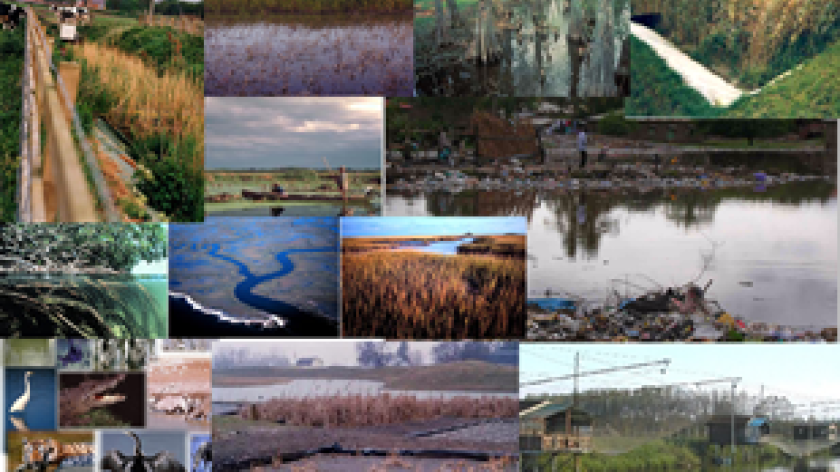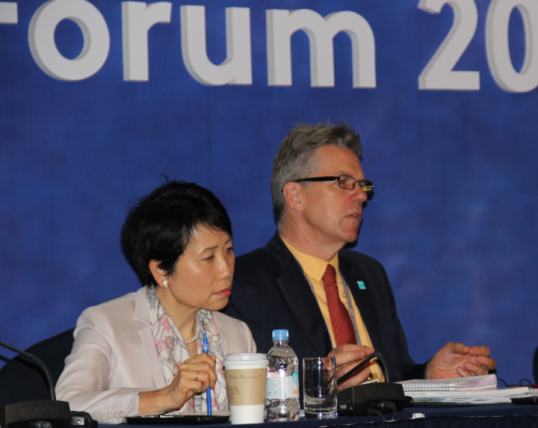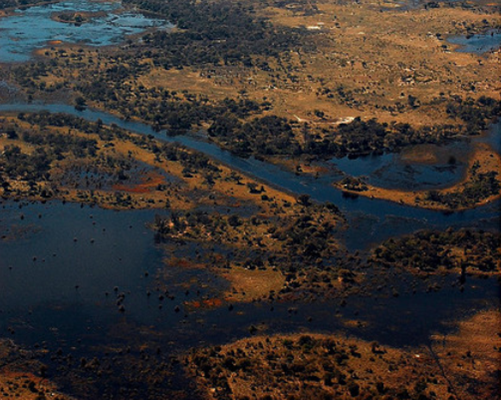
For far too long wetlands in all its forms have been labeled as "smelly, insect infested, and disease ridden" places. They have been used as the ecosystem of choice to dump unwanted substances into, to dredge for resources, drain for infrastructure or agricultural purposes. A switch to a more respectful attitude towards those precious natural ecosystems is much needed.
This has been the topic of a discussion organized by the Ramsar Convention on Wetlands and the World Wildlife Fund at the seventh World Water Forum in Daegu, Korea on Tuesday, April 17. GEF CEO Naoko Ishii attended the dialogue to reconfirm that Wetlands will continue to play an important role in the water programs financed during the GEF's sixth replenishment cycle.

The world is more and more becoming aware that these key ecosystems provide a myriad of direct services to humans' well-being, and represent tremendous values in supporting and protecting existing infrastructure:
• Coastal wetlands reduce the impacts from hurricanes. In the United States wetlands provide storm protection services valued of US$23.2 billion per year.
• In Europe, the Danube River provides flood mitigation functions valued at EUR650 million per year.
• In the Caribbean, coral reefs provide shoreline protection services valued at US$2.2 billion per year.
• A marsh area near Colombo, Sri Lanka, provides flood protection and wastewater treatment services to the local population, valued at USD$6.6 million per year.
The value of wetlands is not only huge but also delivering multiple co-benefits at an estimated value of $70 billion USD/year.
However, wetlands systems are no exception to the earth ecosystem whose sustainability has been impacted by human development. Human activities have heavily impacted the natural occurring wetlands across the world, through damming, diking and canalizing rivers, converting floodplains to aquaculture, planting trees in swamps, draining marshes for agricultural purposes, forestry and urban development schemes.
On top of them, climate change is further deteriorating the general state of wetlands. Ironically it is becoming more evident than ever, that coastal and inland wetlands provides an essential buffer against erosion and flooding. The global discussion in 2015 on the SDGs provides a unique opportunity to harness the political attention towards utilizing the earth ecosystems as an effective solution to the sustainability challenges we are facing.

The GEF has taken into account the importance of Wetlands since its inception, leading to direct GEF investments in the amount of USD $2 billion in grants, leveraging over USD $11 billion in co-financing towards wetlands. This either as projects entirely focused on wetlands or as part of projects with significant wetland components. These projects have been funded out of the Biodiversity, Climate Change, Land Degradation and the International Waters Focal Areas, highlighting that Wetlands are pivotal for securing multiple environmental services and supporting a range of terrestrial and marine systems.
Inland and marine wetlands have a central role in food production, water availability, sustaining biodiversity while buffering against climate change impacts. Safeguarding wetlands and the role they play in our societies and economies will be essential to successfully delivering towards the Aichi Targets, the SDGs in September and the Climate agreement in December.
GEF CEO Naoko Ishii said: "2015 should be the year we are moving towards solutions with concrete actions. We need to bring all key stakeholders together for concerted action platforms. This is particularly important to wetlands system as many of them are fed by water systems that are shared by two or more nations and these transboundary resources are interlinked by a complex web of environmental, political, economic and security interdependencies."
The GEF and partners have been financing the first global-scale assessment of transboundary water ecosystems. The work is being coordinated by UNEP working with more than 140 research and scientific organisations to be able to identify stresses on the ecosystem and indicators to measure impact and the health of the ecosystem. The goal is to improve knowledge for informed decision-making, raise awareness and foster cooperation among all stakeholders.
Ishii added: "We need to draw the attention of the world's policy makers, so they realize that water systems not only provide immediate benefits to hundreds of millions of people depend on healthy functioning wetlands, but also regional and global benefits to keep the integrity of earth's ecosystems. The global community needs to stand together to make sure that Wetlands gets the needed attention on the global agenda."